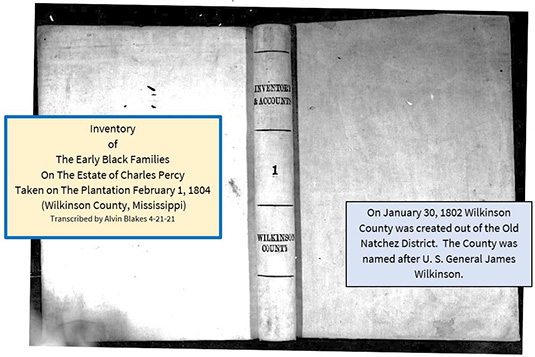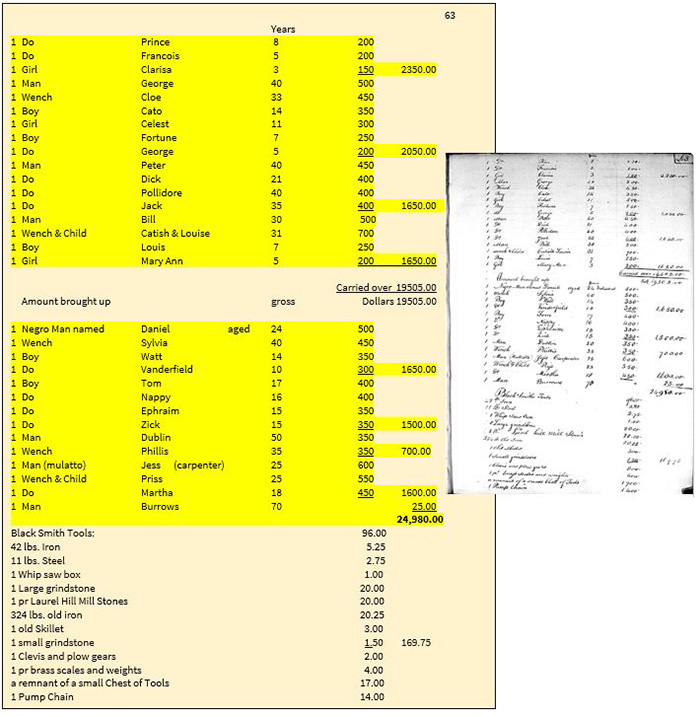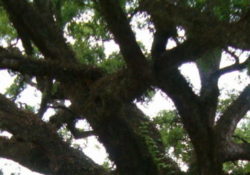Part 4. 1804 Inventory of the Black Families
The 1794 inventory taken after the death of Charles Percy revealed that the Percy Estate was not only free of debt, but that it had created great wealth, a reported $22,400, not including the value of the land. This meant that the enslaved people on the plantation would be kept intact, and that the entire Estate would become the property of Percy’s wife and children.
After the death of Susanna Collins Percy in 1803, the Wilkinson County Orphans Court ordered a new inventory to be taken on February 1, 1804.




The new 1804 inventory was taken 10 years after the death of Percy and showed the number of people enslaved on the Percy Plantations has grown from 55 to 79, and their value has more than doubled from $11, 970 to $24,980. Some of those now listed on the Estate likely were newly purchased during the 10-year span. However, 21 children – 10 years old and younger, were born to families on the plantation.
Our African ancestors whose identity & names were taken away are now being called Negroes and wenches on a property list, with individuals valued at up to $600 or as little as $25 once they were older or did not have the ability to do hard manual labor. The documents do not explain why some of the children of female heads of families are designated as “mulattoe,” but in the future DNA results may reveal to us who fathered the children.
The complete inventory and division of the estate is contained on pages 59-77 until every tea cup, napkin holder, tool, head of livestock, and bale of cotton is priced, for a total estate value of $41,634.95. In addition, 7,100 acres of land owned by Percy was inventoried and valued at $32,400, resulting in a total estate value of $74,034.

Cotton
Page 69 of the Inventory shows 30,772 pounds of cotton was ginned in the crop of 1803. At a selling price of 16 cents per pound, cotton accounted for $4,923.53 of the Estate value.
There were a few indigo planting tools listed in the inventory, but no indigo crop values given. The plantations have evolved to cotton production only.
The division of the inventory continued on page 72.
“Pursuant to an Order of the Orphans Court of Wilkinson County Mississippi Territory and in conformity to the last Will and Testament of Charles Percy deceased; we the undersigned Commissioners do assign to Sarah Ellis, Thomas Percy, Catherine Percy and Ann Percy, the legal heirs of the said Charles Percy deceased, their several shares of the estate both real and personal of the aforesaid deceased as follows.”
This is foreboding, because years later, as some of the Percy children decide to leave Woodville with the enslaved families, some of them will never see their families again.
Next: Division of the Black Families


Another good read. Keep up the excellent work.
Thanks for reading.
I enjoyed reading and learning about Edgefield matter of fact my great great grandmother on my father’s side her name was Jane Collins who married Richard Palmer back in the early 1800
Lillie thanks for reading. Let’s call the names of all of our ancestors and bring them forward.
Great information and detailed illustrations. Enjoyed the read.
Thanks Cynthia.
I am enjoying the journey that you are taking us on…this information is so valuable and timely! Thank you!
Thanks Vernita. This is a big story and I’m trying to take the necessary time to tell it right. Hundreds of our family members will get to see their ancestors emerge from these early records.
Thanks for all that you are doing in unraveling our ancestors. I would love to talk with you. Who are your relatives in West Feliciana. My family is from there and were enslaved by the Percy family.
LaDeta,
I will briefly mention the Percy branch off into St. Francisville (formerly Bayou Sara) Louisiana in one of my future blogs in this series. The West Feliciana Percys are descendants of Charles Percy’s son Robert Percy.
Your work is remarkable. I look forward to learning more.
Tonya thanks for reading. I am glad you are able to get something out of it. Keeping alive the memory of these early ancestors and being able to call them by their names is very important to me.
Cuz, I’m appreciative to learn of our history but to think about how our ancestors were enslaved with a price tag, incense me still. Sold from one plantation to the other and never seeing their love ones again is gut wrenching. As a woman, when I think about how that nasty, low down slave master, ravished our children, our mothers, our grandmothers, ours great……………………mama, I cringe. And we do know he fathered the mulatto children. People in actuality, all of that land our ancestors
slaved on was and is rightfully ours. But our God delivered us and I’m free; we are free-er. For all that our ancestors endured and for racism that runs rapid today, I decree Restitution now and Restitution forever ! Thank you Cuz for all that you give.
Jackie thank you for your passionate comments. This is the trauma that our families went through in slavery days. They wanted us to remember their story and to call their names.
Great blog as usual, Alvin.
Gerri, thanks for reading and following along.
As a family member of the Percy’s this is astonishing to read. It’s upsetting to hear as a black male that my ancestors caused so much hurt and destruction. My grandmother was half white and her father a percy, as was she. He had I guess, before marrying, slept with one of the maids and out came my grandmother . She was given a small parcel of land by him at some point and was always well taken care of and loved by him from what she told me so this is horrifying but not surprising to hear.
Hey Derrick! Thanks for reading my blog and sending your comments. Read the comments from other descendants of the Percys throughout the blog series, especially Part 2 http://almostdisappeared.com/black-families-of-edgefield-plantation-part-2/. There is a lot of available information on the slaveholding Percys in Louisiana and Mississippi, and as I discuss in Part 8, the Percys also took some of our enslaved families from Woodville, Mississippi to Huntsville, Alabama. If you want to discuss further email me at alblakes1@gmail.com.